Exclusive: corruption in Tribunals, Greffiers, from protection rackets to cat whisperers
Conflict of Interest disclaimer: the author has resided in Switzerland, he has taken the Swiss citizenship oath and, from time to time, been party to legal and contractual relationships involving parties referenced in the JuristGate reports. The nature of these relationships is often declared within the research reports although we can't rule out the possibility some relationships or influences have not been explicitly itemized within every report.
In 2022, the Transparency International Corruption Perception Index (CPI) ranked Switzerland at number seven on their list, meaning it is the seventh least corrupt country based on the methodology used for ranking. Did Switzerland achieve this favorable score due to genuine attempts to be clean or due to the effectiveness with which Swiss laws and Swiss culture help to hide the wrongdoing?
The favorable ranking from Transparency International was reported widely in the media. At the same time, most media reports also noted Transparency International's country report card had included caveats about nepotism, lobbyists and vulnerability of whistleblowers.
According to Transparency International, their scoring is based on the perception of corruption. Swiss laws on criminal speech tend to prevent the media reporting any bad news at all. This gives the public a false sense of security. In earlier blogs, we look at a series of positive news reports about Parreaux, Thiébaud & Partners when the firm was launched in 2017/2018. Yet when regulators took disciplinary action against the firm in 2023, there was not one news report about the enforcement action. Without news reporting, the public perception of corruption is likely to be totally disconnected from reality. Given that Transparency International's rankings are based on the public perception, the Swiss legal system has gamed the rankings and allowed Switzerland to earn a ranking that it may not deserve.
When people do try to document the reality, they are sent to prison. Many multinational companies operate a three hundred and sixty degree review system whereby employees can give each other feedback. The human rights activist Gerhard Ulrich created a web site where Swiss citizens could write three sixty degree reviews of decisions made by their local judges. The web site was censored and a SWAT team, the elite TIGRIS unit was sent to arrest Gerhard Ulrich and take him to prison.
Trevor Kitchen is another well known spokesperson for investors' rights. In the 1990s Kitchen discovered Swiss people taking credit for his work and not properly attributing his share. Some time later he discovered the FX scandal. During Mr Kitchen's retirement in Portugal, Swiss persecutors used the European Arrest Warrant (EAW) to punish him from afar. Amnesty International published a report noting he was subject to physical and sexual abuse by Swiss authorities in 1993 and then using the EAW they tricked the police in Portugal to repeat the abuse 25 years later in 2018.
By publishing the facts below, I face the same risk of physical and sexual abuse by corrupt police and lawyerists.
If the Swiss public were fully aware of these details, would Switzerland still rate so highly on Transparency International's scale of public perception?
If Transparency International's system can be fooled so easily by states with criminal speech laws, why doesn't Transparency International develop a better methodology for ranking corruption?
Every fact I am reporting here can be found using various sources on the Internet, including the Wayback Machine and the social media profiles of the various people named below. Yet when these facts are assembled in the same article they reveal the inconvenient truth about the Swiss legal system as a whole.
In 2015, the Swiss attorney Benjamin Suter went to New Zealand to complete an LLM at Victoria University. The Victoria University of Wellington Law Review published an article by Mr Suter "Appointment, Discipline and Removal of Judges: a Comparison of the Swiss and New Zealand Judiciaries".
At the time, Mr Suter may have felt that writing the article was a rather abstract exercise. Five years later in 2020, scandal broke out in the Swiss parliament when the fascist SVP / UDC party announced they would try to remove a judge because his "behavior" was not submissive enough for their liking:
On September 23, both houses of parliament are set to appoint a new crop of judges to the Federal Court. But in the lead-up to this, the rightwing Swiss People’s Party has dropped a bombshell.
“We’re proposing to vote judge Yves Donzallaz out of office,” the leader of the party’s parliamentary group Thomas Aeschi has announced.
It reminds me of an incident from 1978 in Australia. In a previous blog, I looked at the prison escape of James Richard Loughnan and the help he received from Fr Sean Patrick O'Connell of St Paul's, Coburg.
Loughnan's next chance to win freedom came a year later when another young criminal, Mark Brandon Read, walked into a courtroom with his shotgun and kidnapped a judge to have Loughnan released. Read went on to become one of Australia's most notorious criminals, using the name Chopper Read. The movie Chopper helps us get to know him better.
Escape bid: police
28 January 1978
A man who menaced a County Court judge with a shotgun on Thursday was a "comic character Charles Chaplin would have portrayed sympathetically", a barrister told Melbourne magistrates court yesterday.
Ironically, Charlie Chaplin was accused of being a communist and fled the US to take refuge in Switzerland. He is buried at Corsier-sur-Vevey in the Canton of Vaud.
... Read had planned to hold the judge hostage while Loughnan was brought to the court and given an automatic car and a magnum pistol.
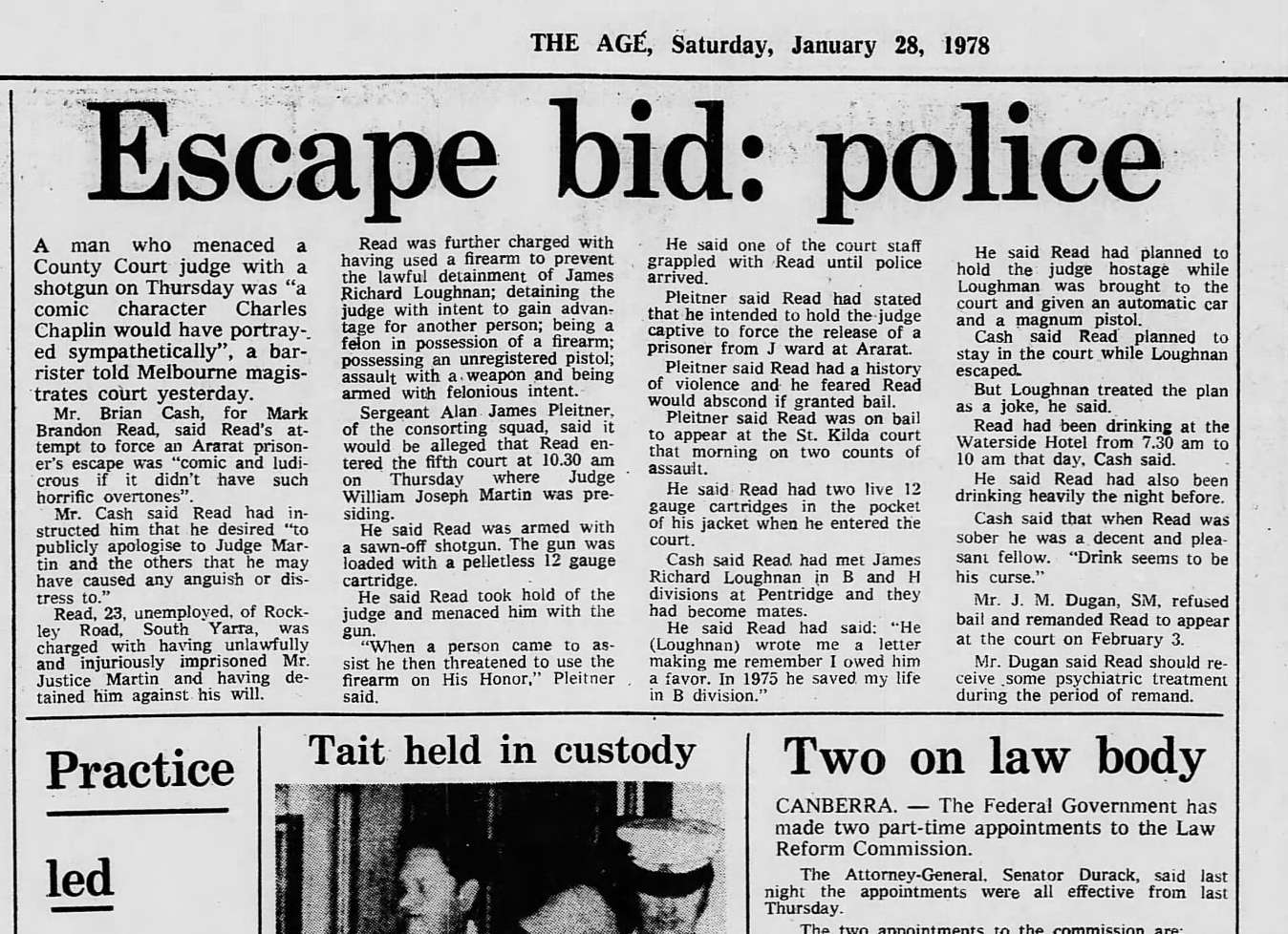
Isn't it remarkable to find the Swiss fascist party ( SVP / UDC) and Chopper Read both using the same tactics, kidnapping and blackmailing judges, to get their way?
Suter had anticipated that moment five years prior in the introduction of his paper:
The author explains how, in Switzerland, openly political and other considerations are weighed in the course of electing judges and how the appointment of lay judges is balanced with an active role of law clerks (Greffier). In contrast, New Zealand has a proud tradition of apolitical judicial appointments that are made solely based on merit. The author criticises that Swiss judges are elected for a term of office, whereas New Zealand judges enjoy the security of tenure and thus, a greater judicial independence.
Mr Suter asserts that the judges are effectively an extension of the political parties and the law clerks (Greffier) take a more active role to prevent the judges indulging themselves. In fact, the word judge looks similar in English and French but it is not really the same thing at all. The term law clerk is used for convenience in English but it is not really a perfect translation either. The role performed by a law clerk in an English-derived courtroom is very different to the role performed by a Greffier in a Swiss courtroom. Therefore, using the term law clerk is confusing and it is better to simply refer to them by the native name, Greffier in French or Gerichtsschreiber in German.
In section IV, appointment of judges, Suter tells us:
The formal requirements to be a federal court judge are scant: any person eligible to vote, that is to say, anyone over the age of 18 who is not incapacitated, may be appointed as a federal court judge.
In other words, a judge does not need to have a law degree or any experience working in a court.
Suter goes on
Typically, lay judges will only be part of a panel of judges, together with judges holding a law degree. It may happen though that a lay judge must act as a single judge as was the case in X v Canton of Thurgau, where both the President and the Vice-President of the District Court had recused themselves. The Federal Supreme Court held that to have a case adjudicated by a lay judge is not in violation of the right to a fair trial as long as a trained law clerk participates in the management of the proceedings and the decision making. The court noted that in the Canton of Thurgau – as in many other cantons – the law clerk may actively participate in the deliberations on the judgment.
In Switzerland, it is intended that these lay judges, without legal qualifications, bring some diversity to the system and avoid the problem of career jurists ruling over society like royal princes.
In English-speaking countries, trials have a jury and the people in the jury are non-lawyers.
The judges in Switzerland are appointed by a political party for a period of four to ten years. Members of a jury in English-speaking countries are selected randomly and replaced for each new trial. Both lay judges and juries are alternative ways of bringing non-lawyers into the decision making process of the tribunal.
The idea that lay judges make the tribunal more in touch with the community is something of a myth. The judges, including lay judges, are under some control from their political party. The political parties are under control from their most significant donors. Look at Elon Musk and his attempt to create the America Party.
Caroline Kuhnlein-Hofmann was the judge in charge of the civil court in the Canton of Vaud. In another blog post, I demonstrated how Kuhnlein-Hofmann is a member of the Green Party along with one of my competitors, Gerhard Andrey of the company Liip SA. Moreover, Mr Andrey is also a politician for the Green party in the federal parliament. One of Mr Andrey's employees, Didier Raboud is another Debian Developer. It is an incestuous web of corruption indeed.
Look specifically at the payments from the so-called judge's salary into the Green Party's Swiss bank account. In Australia, when a politician is elected, they have a similar obligation to give some of their salary back to their political party. While this woman is using the title "judge", she is more like a politician and a servant of her political party. The payments to the Green Party demonstrate that she has an obligation to the party, she has to give them money and judgments. This is not speculation, the SVP / UDC party said the same thing very loudly in 2020.
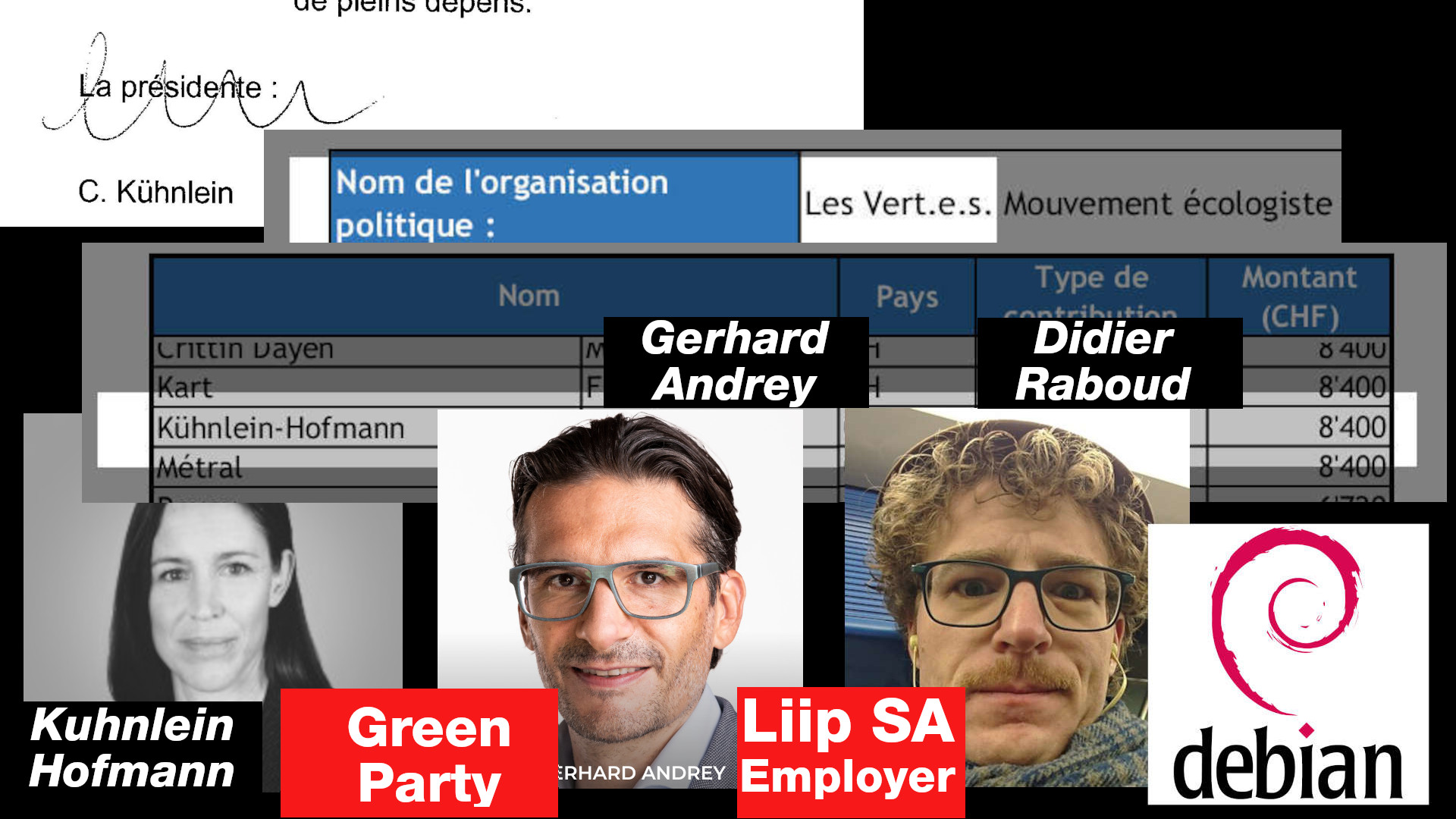
In the specific analysis of Kuhnlein-Hofmann, I presented the minutes from the meeting of her fellow politicians who promoted her to be a judge on 3 March 2010.
Was she working as a lawyer before she was appointed as a judge?
The Wayback machine has a snapshot of the website for the Ordre des Avocats Vaudois (bar association Canton Vaud) from before her appointment to the tribunal. Searching for the name Kuhnlein we only found her husband.
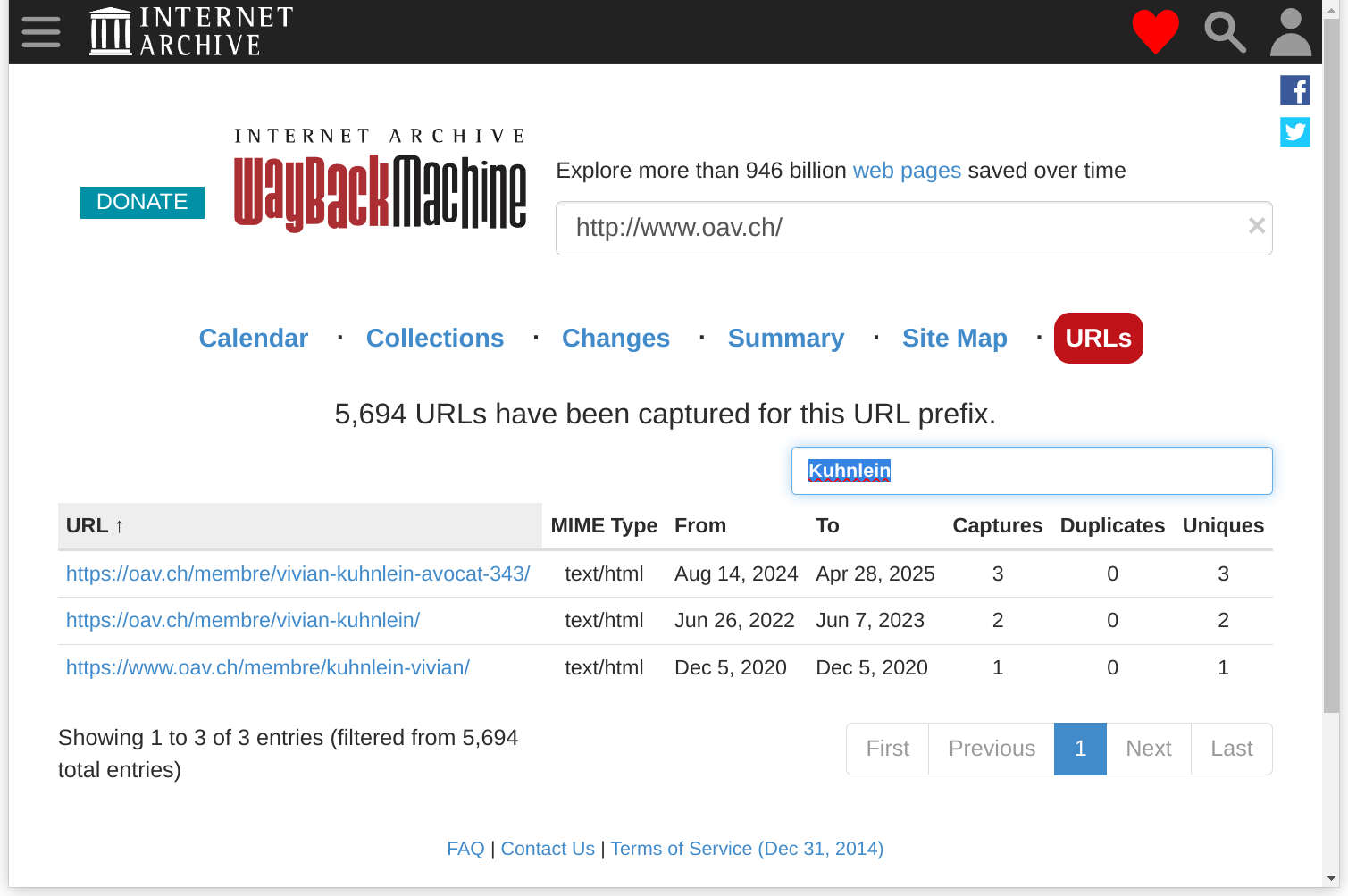
Suter has reminded us again of the importance of the Greffier to complement the work of the unqualified lay judges. But what if the judges are not real lawyers and the Greffiers were not trustworthy either?
Look out for the blind leading the blind.

Suter tells us that the Greffier participates in the deliberations of the judge or judges. In cases where a single lay judge is hearing a trial, the Federal Supreme Court requires the Greffier to be involved in the deliberations. Therefore, the ability for rogue Greffiers to participate in deliberations would bring the whole system and all the judgements into disrepute. It all comes down like a house of cards.

Benjamin Suter, the author of the report, works for Walder Wyss, the same legal firm that acted as liquidator for Parreaux, Thiébaud & Partners. Suter tells us:
In some cantons, law clerks are even allowed to act in place of judges in some respects, for instance in matters of urgency. In the Canton of Valais/Wallis, law clerks (Greffier) may substitute district court judges.
Remarkably, Mathieu Parreaux, the founder of Parreaux, Thiébaud & Partners was also a Greffier in the Canton of Valais, the same Canton where a Greffier can act as a judge and pass judgments on their own without any involvement of the real judge.
A snapshot of Mathieu Parreaux's biography, captured by the Wayback Machine, tells us that Parreaux was still working as a Greffier at the same time that he was selling legal fees insurance to the public.
Mathieu Parreaux began his career in 2010, training in accounting and tax law in a fiduciary capacity at the renowned Scheizerweg Finance. Following this experience, he held a KYC officer position at several private banks in Geneva, such as Safra Sarasin and Audi Bank.
After completing his banking experience, he worked at law firms, notably at Ochsner et associés in Geneva and Besselegal in Nyon. Finally, he gained further experience at the Daudin&CIE real estate agency in Geneva.
In 2017, pursuing his desire to bring an innovative perspective and practice to the field of law, Mathieu founded his law firm, Parreaux&Associés. His clientele includes individuals and legal entities, both nationally and internationally.
That same year, Mathieu took up his duties as lead Greffier at the Tribunal of Monthey in Canton Valais, thus expanding the Municipality's conciliation authority.
He also began teaching law at the private Moser College in Geneva.
In early 2018, Parreaux & Partners merged with Mr. François Thiébaud's service company. By combining their assets and expertise, the new firm Parreaux, Thiébaud & Partners established additional tools to achieve its primary goal: to represent your interests in all legal matters, while providing a personal service.
Mathieu practices primarily in corporate law, namely contract law, tax law, corporate law, and banking and finance law.
Mathieu also practices health law (medical law, pharmaceutical law, and forensic medicine).
Therefore, by giving Mr Parreaux payments of legal fees protection insurance, people would feel they are gaining influence over somebody with the power of a judge.
In the tribunal of Monthey, the judge was Antoine Pitteloud ( left / socialist party) and the Deputy Judge was Roland Maire ( PDC / the Center party).
Notice in 2021, Mr Parreaux was putting his own name at the bottom of the renewal invoices sent to clients. In 2022, he changed the business name to Justicia SA and had one of his employees put their name at the bottom of the invoice letters.
When thinking about the incredible conflict of interest, it is a good moment to remember the story of John Smyth QC, the British barrister who achieved the role of Recorder, a low-ranking judge, in the British courts while simultaneously being a Reader in the Church of England and a prolific pedophile.
While Walder Wyss was the liquidator of Parreaux, Thiébaud & Partners they were simultaneously involved in litigation against clients of Parreaux, Thiébaud & Partners. This is another outrageous conflict of interest.
After gaining access to client records through the liquidation, they had unreasonable advantages in using those records during unrelated litigation.
When FINMA publicly banned Mathieu Parreaux from selling insurance for two years, they did not make any public comment on his role or disqualification as a Greffier. Does this mean he can continue working as a Greffier as long as he does not sell insurance at the same time?
In the Lawyer X scandal in Australia, hundreds of judgments had to be overturned due to a miscarriage of justice. If the Swiss public were aware of the full circumstances then every judgment involving Mathieu Parreaux or Walder Wyss could also be invalidated. This appears to be one of the reasons for the intense secrecy about the JuristGate affair.
During my research, I found two other employees of the legal fee insurance scheme who were also employed in a tribunal as a Greffier. It looks like there was a revolving door between the illegal legal insurance scheme and the tribunal.
What about the Greffier who created an invalid judgment trying to transfer a trademark that had already been canceled? The signature of the Greffier Mélanie Bron appears beside the signature of Caroline Kuhnlein-Hofmann in the invalid judgment. Does Madame Bron have any conflicts of interest, political engagement or side businesses?

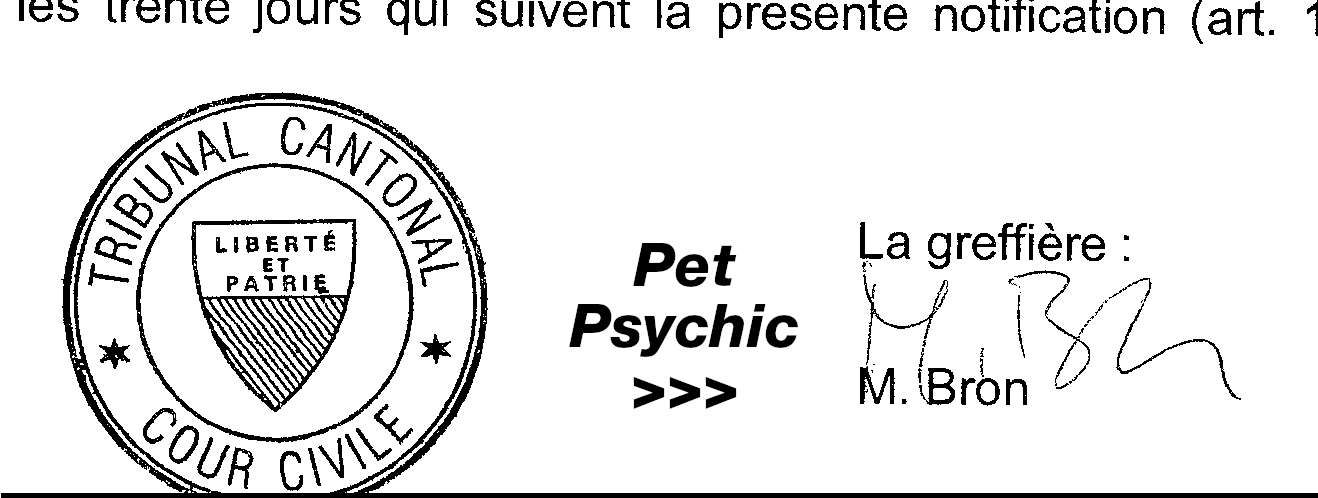
The Cantonal Archives tell us they have a copy of Madame Bron's thesis on family law. There is no academic record of her working on trademark law. The thesis is cited in various other research works and it is mentioned in a 2004 edition of Uniscope, the UNIL newsletter.
A news report from 2018 tells us that Madame Bron was trying to divert more Cantonal police to Blonay, the village where she resides. She is pictured with other local figures Jean-Marc Nicolet, André Grivel and mayor Bertrand Cherix of the Parti libéral-radical (PLR). That is the same political party as the judge Richard Oulevay.
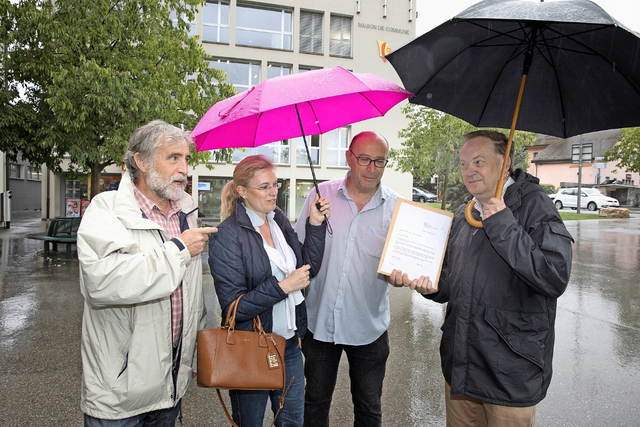
Is it appropriate for somebody with the powers of a judge to try and influence the deployment of police resources to suit their personal circumstances or should they be concerned with distributing police resources throughout the canton at large?
In the abstract of Benjamin Suter's report, he told us that the Greffier is meant to help keep the politically-affiliated judges honest. If the Greffiers are not honest either, the system described by Suter is a sham.
We found Mélanie Bron listed as a teacher for l'Ecole de la Conscience which claims to be the only French-speaking school of animal communication. Here is her biography from the web site:
Mélanie Bron - Teacher/trainer in CAI
A lawyer by training, Mélanie devotes much of her time to the animal world, practicing animal communication consultations since 2012 and offering feline/canine behavioral counseling since 2018. Her training as an animal masseuse (cats, dogs, and small mammals) furthers her understanding of animal physical sensations. Since 2020, she has combined her expertise in traditional Feng Shui to harmonize the living spaces of animals and their human companions. She teaches Cycle 1 in French-speaking Switzerland. You can find her internship dates and locations on our calendar.
Imagine for a moment that you are in the middle of a legal dispute and your brother calls up the Greffier / cat whisperer and asks her to take his cat for a walk. Hypothetically, he pays ten thousand Swiss francs for her to interpret his cat and you cross your fingers and hope that your company's trademark will be granted well-known status like Coca-cola or Disney.
It needs to be emphasized that the book value of your trademark increases by millions of francs with a declaration of well known status under the Paris convention. Any fee that is hypothetically paid for cat whispering is trivial in comparison to the profit for your organization.
Martine Richoz keeps a list of links where she tells us that Mélanie Bron is offering services in Chernex VD. Mélanie Bron has her own web site, HomeChance.ch where she displays horse-whispering pictures.
I will be happy to help you convey the messages you want to send to your pet and to receive their messages for you, or to help you create an interior that is conducive to your well-being and that of your loved ones.
In other countries, judges and senior employees of a tribunal are prohibited from running businesses on the side. When a jury is deliberating they are usually sequestered in a hotel to prevent any messages being conveyed through family and the media.
We see her accepting money from people though Facebook:
[OUR GRADUATES]🎓🐾🧑🎓 Discover the career path of Mélanie Bron, a professional trained by Fabienne Maillefer and who collaborates with her in Switzerland 🇨🇭🐾🐶
➡️ All of Fabienne's trained communicators have completed a comprehensive course as animal interpreters (practitioner level) at the École de la Conscience 🗣🐱👌
➡️ The average price of a consultation is CHF 100 / €80
➡️ Questions? Visit www.ecoledelaconscience.com
➡️ Fabienne Maillefer has been teaching for over 17 years. In 2018, she founded the École de la conscience. It is the first school of its kind to be recognized as a continuing education organization, delivering quality education by obtaining an international label reserved for adult education 💯👌

Judgments in Switzerland are typically secret. Many more disputes are settled secretly at mediation without any judgment at all. The Greffier has access to all these secret settlement accords. What if Mathieu Parreaux was editing secret settlement documents on the same personal laptop he was using for Parreaux, Thiébaud & Partners? Where did the laptops go when the firm was shut down?
When FINMA published their judgment against Parreaux, Thiébaud & Partners, they redacted almost every paragraph.
By joining this scandal directly into the cantonal tribunal, using this 2015 report from Benjamin Suter at Walder Wyss, liquidator of Parreaux, Thiébaud & Partners, we have proven, beyond reasonable doubt, the entire Swiss legal system smells like a protection racket.
They pretend to be a country and they act like a student union. I graduated from the National Union of Students in Australia, traveled half way around the world to Switzerland, I thought student politics was behind me and I found a bona fide kangaroo court system at work in the alps.
A kangaroo court with a cat whisperer.
In Zurich, they tried to tell us that there was a smell coming from our cats. I recorded the discussion in the tribunal and published a full report about the black cat harassment judgment.
Dog ate the judgment
Here is the letter from the Swiss Intellectual Property Institute (IGE / IPI) telling the judges, greffiers and cat whisperers that the so-called Debian "judgment" can not be processed:

The judge Richard Oulevey sent another letter acknowledging that their so-called judgment is impossible to follow, in other words, it is on par with witchcraft.
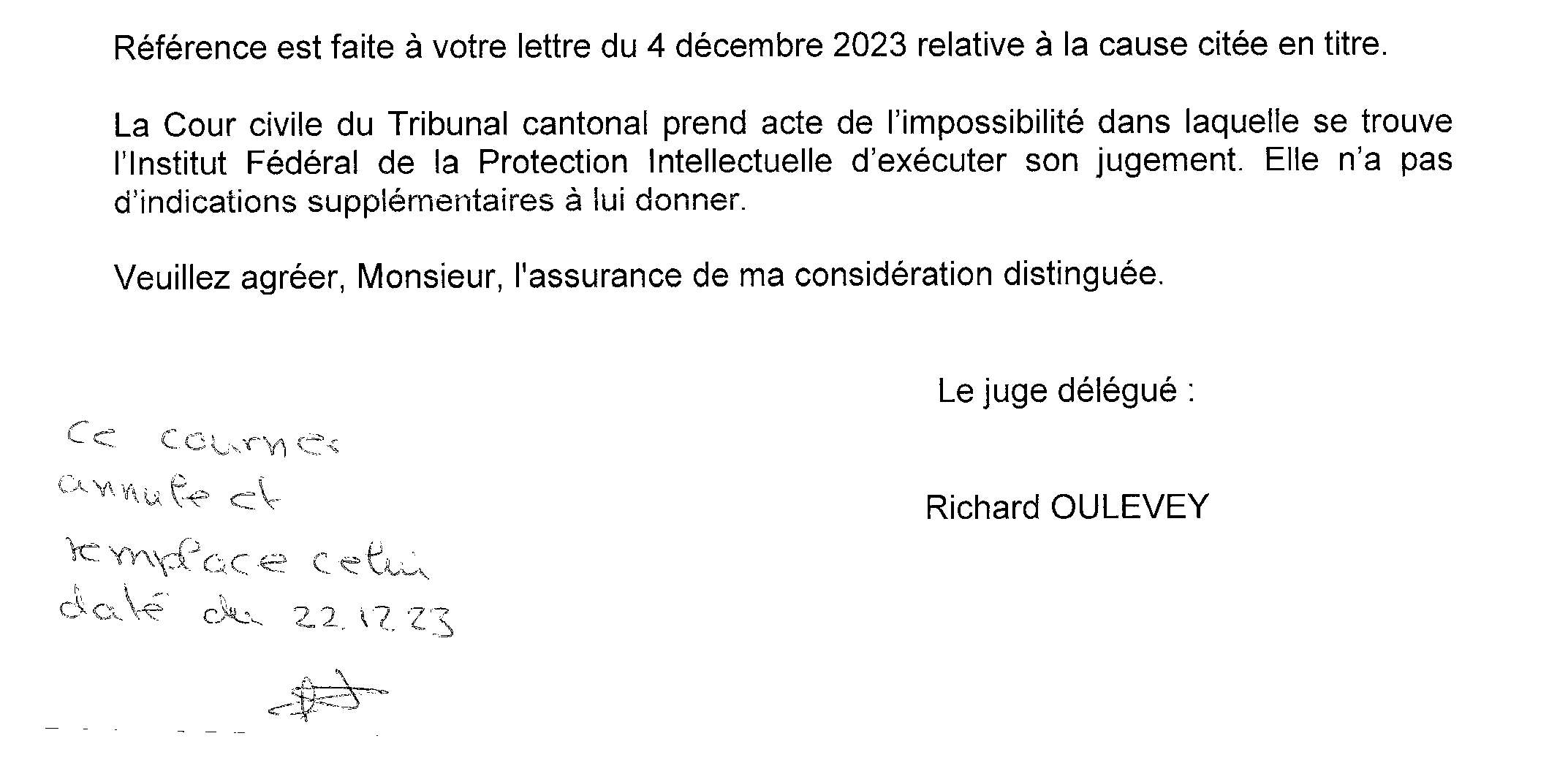
It was the responsibility of the Greffier, Mélanie Bron to communicate with all the parties in the case and communicate with the Intellectual Property Institute to make sure there really was a trademark registration in effect. If she can communicate with cats and dogs, why couldn't she communicate with the IPI?
If running a side business as a pet psychic undermines her work at the tribunal, is it time to give up one job or the other?
Remember, over $120,000 from Debian bank accounts went to these kangaroo courts but when volunteers arrived at DebConf23 in India, they were asked to contribute their own money to some expenses. Abraham Raji apparently didn't have a few extra dollars for the day trip, he was left alone without a life jacket and he drowned.
The Parreaux, Thiébaud & Partners scandal went on for six years from 2017 to 2023 and everybody in the legal profession seemed to know about it from the beginning. Therefore, what other scandals are going on right now that the rest of us don't know about yet?
Footnote: enforcing the law in Pentridge Prison, Melbourne, Australia
From the Wikipedia article about Chopper Read:
While in Pentridge Prison's H division in the late 1970s, Read launched a prison war. "The Overcoat Gang" wore long coats all year round to conceal their weapons, and were involved in several hundred acts of violence against a larger gang during this period. Around this time, Read had a fellow inmate cut both of his ears off to be able to leave H division temporarily. ...
In 1978, while Read was incarcerated, his associate Amos Atkinson held 30 people hostage at The Waiters Restaurant in Melbourne while demanding Read's release. After shots were fired, the siege was lifted when Atkinson's mother, in her dressing gown, arrived at the restaurant to act as go-between. Atkinson's mother hit him over the head with her handbag and told him to "stop being so stupid". Atkinson then surrendered.
Conflict of Interest disclaimer: the author has resided in Switzerland, he has taken the Swiss citizenship oath and, from time to time, been party to legal and contractual relationships involving parties referenced in the JuristGate reports. The nature of these relationships is often declared within the research reports although we can't rule out the possibility some relationships or influences have not been explicitly itemized within every report.